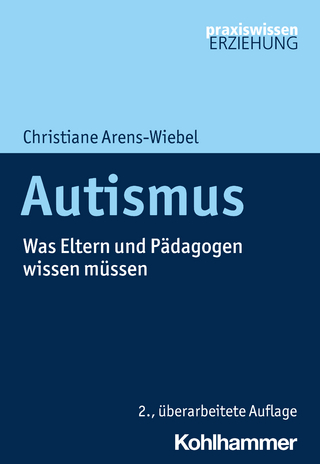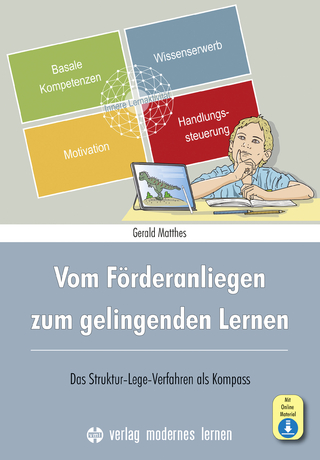
Parents and Families of Students With Special Needs
SAGE Publications Inc (Verlag)
978-1-5063-1600-0 (ISBN)
Parents and Families of Students With Special Needs: Collaborating Across the Age Span teaches students the skills they need to effectively collaborate with parents and families to ensure a child′s success in the classroom. The text takes a lifespan approach with a special emphasis on the critical transition points in a child’s life. Information is provided on what can be seen at each stage of an individual with disabilities’ development, and addresses the concerns and needs that families may have during these unique phases of growth. The authors provide an in-depth discussion of how parents and families are affected by particular disabilities, family system theory, the laws that affect individuals with disabilities, and assessments for individuals with disabilities. Chapters written by academics and professionals who are also parents of students with special needs bring a diverse range of voices into the narrative.
Dr. Vicki A. McGinley, professor, is a faculty member at West Chester University of PA in the Special Education Department. She has taught both undergraduate and graduate courses in foundations, communication and behavioral disorders, action research, family systems, and legal issues. She has served in two states as a due process hearing officer and serves as a university fact finder as well as state mediator. Presently, her service and research focuses on trauma informed education, international special education and working directly with children and teachers in schools. She was recently awarded a research and teaching Fulbright Scholarship to work in Eastern Europe. Her publications reflect her teaching and service work.
Defining the Family - Tara Guierrero
Family Systems Theory - Vanessa Johnson
Families of Children At-Risk for Disability - Barry Bullis, Samuel Zimmerman
The Professionals and What Are Their Roles? - Natalie Williams, Tori Lybbert
Family Assessment and Research Based Interventions - Vicki McGinley
The Laws that Support Families - Shirley Dawson, Tracie McLaughlin
Birth through Age 5 - Brenda Eaton
The Primary School Years - Melissa Hudson
Secondary School Years - Melina Alexander, Desna Bergold
Post School - Brian Freedman, Laura Eisenman, Cathy Cowin, Sean Roy
Prominent Disabilities Across the Lifespan - Mary Houser
Siblings of Children with Disabilities - Kerry Smith
Section I: FOUNDATIONS, DEFINITION, AND ASSESSMENT
Chapter 1 Defining the Family - Tara S. Guerriero
The Role of the Family in a Child’s Education
Identifying and Defining Children and the Family
Childhood Living Arrangements
Type of Families
Unique Familial Circumstances that may Influence Education
Educating all Children
Chapter 2: Family Systems Theory - Sandra Sepulveda-Kozakowski
What is Family Systems Theory?
The Family Identity
Family Subsystems
Boundaries
Communication
Cohesion
Adaptability/ Flexibility
Climate
The Family Life Cycle
Factors Impacting Family Systems
External Systems
Coordination of Care
Parenting Relationships
Culture, Race, and Ethnicity
Spotlight on Children in Foster Care
Chapter 3: Families of Children At-risk for Disability - Barry Bullis, Samuel Zimmerman
Why Study Risk?
Benefits of Identifying Risk
Definition of Risk
Categories of Risk
Children Living in Poverty
English Learners
Students Experiencing Marginalization
Gifted Children
Developmental Follow-up
Chapter 4: Laws that Support Families - Shirley Dawson, Tracie McLaurghlan, Denise Adams
History
Individuals with Disabilities Education Act (IDEA)
Provisions
Section 504
Americans with Disabilities Act Amendments Act
Elementary and Secondary Education Act (ESEA)
Family Educational Rights and Privacy Act of 1974
Chapter 5: The Professionals and Their Roles - Natalie A. Williams, Kristin L. Nelson, Tori J. Lybert
Professionals of the Multidisciplinary Team
Benefits of Partnerships
Family-Staff Relationships
Peer Relationships
Building and Sustaining Partnerships
Interpersonal Communication for Partnerships
The Reality of Criticism
Assertiveness Versus Aggressive Communication
Resolving Conflicts
Chapter 6: Assessment to Research-Based Intervention: Providing Families Support - Vicki A. McGinley, Ieva Margevica
Assessment History and Family Involvement
Working with Families to Understand Assessment
Technical Assessment Terminology
Lifespan Assessment
Transition from Part C to Part B
Primary School Years
Secondary School Years: Transition Assessment
Specialized Assessment and Disability Related Assessments
Disability Specific Assessments
Alternative Assessments/Authentic Assessments for Children with Disabilities
The Assessment Report/The Evaluation Report
Making Instructional Decisions for Intervention
Chapter 7: Siblings of Children with Disabilities - Amy F. Conner Love, Lorie Taylor, Lisa P. Turner, Richard Sabousky
Special Relationship
Importance of Siblings and Significance in Today’s Society
Lifelong Relationship
Interactional Dynamics and Relationship Patterns
Children and Adolescent Siblings
Adult Siblings
Temperament
Sibling Effects
Expectations
Characteristics of Sibling Without Disability
Sibling Interactions
Coping and Stress Styles
Strategies to Help Siblings
Siblings as Teachers
Ways to Establish Sibling Teaching Program
Social Interactions
Counseling Siblings
Section II: WORKING WITH FAMILIES OF CHILDREN WITH DISABILITES ACROSS THE LIFE SPAN
Chapter 8: Specific Disabilities Across the Lifespan - Mary A. Houser
Disability Related to Birth Through Age 5
Disability Related to Primary Years
Disability Related to Secondary School Years
Discovering the Presence of a Disability
Selected Disabilities and their Impact on Families
The Benefits of Home-School Collaboration: Teacher and Families working together
Chapter 9: Birth Through Age 5 - Brenda Eaton, Melina Alexander
Children From Birth to Age 3
Early Intervention
Part C of the IDEA
Individual Family Service Plan (IFSP)
Members of the Multidiscilinary Team
Provider(s) of Early Intervention Services
Early Intervention Programming
Members of the Multidisciplinary Team
Content of the IFSP
Outcomes of Early Intervention
Children Ages 3 to 5
Children Ages 3 to 5 With Disabilities
Preschool Programs
Supporting Families with Children With Disabilities Ages Birth Through 5
Chapter 10: The Primary School Years - Melissa E. Hudson
Communicating with Families
Transition to Elementary School
The Individualized Education Program Plan (IEP) Process and Document
The Individualized Education Program Plan
Working Together – The IEP Team and the Collaborative Team Model
Collaborative Team Model
Chapter 11: Secondary School Years - Melina Alexander, Desna Bergold
Adolescence
Early Adolescence
Middle Adolescence
Late Adolescence
Adolescents with Disabilities
Families of Adolescent Students with Disabilities
The Multidisciplinary Team During the Secondary School Years
Roles of Members of the Multidisciplinary Team
Issues Addressed by Multidisciplinary Team During the Secondary School Years
Potential Needs of the Family During the Secondary Years
Chapter 12: Postschool - Brian Freedman, Laura Eisenman, Cathy Cowin, Sean Roy
Post School Outcomes
Predictors of Postschool Success
Age of Majority
Entitlement Versus Eligibility
Understanding Concerns, Knowing Options, and Creating Partnerships
Current Statistics and Optimistic Trends
Career Development
Employment Settings
Rights, Accommodations and Self-Disclosure
Federal Benefits
Common Questions from Families Regarding Specific Issues Related to Employment
Strategies for Partnering with Families
Postsecondary Education
Postsecondary Education Options
From Entitlement to Eligibility
Accommodations
Social Life and Campus Participation
Financial Factors
Strategies for Partnering With Families
Independent and Interdependent Living
Development of Life Skills
Support From State and Federal Government
Types of Residences
Social Relationships and Community Participation
Strategies for Partnering With Families
| Erscheinungsdatum | 22.02.2017 |
|---|---|
| Verlagsort | Thousand Oaks |
| Sprache | englisch |
| Maße | 203 x 254 mm |
| Gewicht | 740 g |
| Themenwelt | Sozialwissenschaften ► Pädagogik ► Sonder-, Heil- und Förderpädagogik |
| ISBN-10 | 1-5063-1600-X / 150631600X |
| ISBN-13 | 978-1-5063-1600-0 / 9781506316000 |
| Zustand | Neuware |
| Haben Sie eine Frage zum Produkt? |
aus dem Bereich


